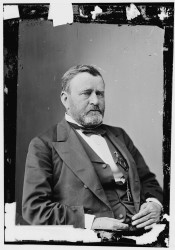Born on April 27, 1822 –2oo years ag0– the 18th President of the United States, Ulysses S. Grant

April 27, 1822 Born in Point Pleasant, Ohio
1839-1843 Attended West Point
1843-1853 Served in the Mexican War and a succession of U.S. Army posts, then resigned his commission.
1854-1858 Farmed near St. Louis, Missouri
1860-1861 Clerked in tannery store at Galena, Illinois
1861-1865 Served in Civil War; commanded all Union Armies
1869-1877 18thPresident
1880 Unsuccessful candidate for Republican presidential nomination
July 23, 1885 Died at Mt. McGregor, New York, aged 63
The country having just emerged from a great rebellion, many questions will come before it for settlement in the next four years which preceding Administrations have never had to deal with. In meeting these it is desirable that they should be approached calmly, without prejudice, hate, or sectional pride, remembering that the greatest good to the greatest number is the object to be attained.
This requires security of person, property, and free religious and political opinion in every part of our common country, without regard to local prejudice. All laws to secure these ends will receive my best efforts for their enforcement.
–Ulysses S. Grant, First Inaugural (March 4, 1869
The conquering hero of the Union, Ulysses S. Grant did not look the part. He was short, scruffy, favored enlisted men’s uniforms, and was dogged by reports of his fondness for drink –a somewhat undeserved reputation. Grant clearly was a drinker at times in his life, but the image of him as a stumbling drunk is a caricature. One successor, Theodore Roosevelt later called him, “The Hammer of the North,” and wrote,
“Grant’s supreme virtue was his doggedness….He was master of strategy and tactics, but he was also a master of hard-hitting. …His name is among the greatest in our history.”
There is no question that he was a dogged, determined general whose command skills helped win the war for the Union. Unfortunately, those strengths did not translate into the complexities of leading the large, swiftly growing, and rapidly changing nation. Another of his successors, James A. Garfield, who served on the battlefield under Grant, once said,
“He has done more than any other President to degrade the character of Cabinet officers by choosing them on the model of the military staff, because of their pleasant personal relationship to him and not because of their national reputation and public needs.”
Garfield was right. Personally honest, Grant was notoriously inept when it came to surrounding himself with men who were corrupt, both in private and as president. Some of them blackened his Presidency; others would reduce Grant to bankruptcy. Finally, a third later successor, Woodrow Wilson, once wrote of him, “The honest, simple-hearted soldier had not added prestige to the presidential office. He himself knew he had failed… that he ought never to have been made president.”
One reason that Grant has been positively reevaluated as President, however, was his commitment to achieving the vote for African Americans. In his 1874 Message to Congress, he said:
Treat the negro as a citizen and a voter, as he is and must remain, and soon parties will be divided, not on the color line, but on principle.
Religion: Methodist (Although raised Methodist, Grant never officially joined a church.)
Education: United States Military Academy (West Point)
Career before Politics: Soldier, farmer, leather shop clerk
Military Service: U.S. Army- Mexican War, Civil War
Political Party: Republican
First Lady: Julia Boggs Dent Grant (January 26, 1826-December 14, 1902) Grant’s best man was West Point classmate James Longstreet, later a Confederate general who attended Lee’s surrender in April 1865.
Children: Frederick, Ulysses S.Grant, Jr. (“Buck”), Ellen (“Nellie”), and Jesse Root Grant
Twelve years later, Grant’s Tomb was dedicated. Built with $600,000 donated by more than 90,000 people, it is the largest mausoleum in North America. Once again, more than one–million people attended the parade and dedication ceremony when Grant was interred in the tomb on April 27, 1897. Grant’s wife, Julia, was also interred –not buried—in Grant’s Tomb, after her death in 1902. It is the site of the General Grant National Memorial (NPS).